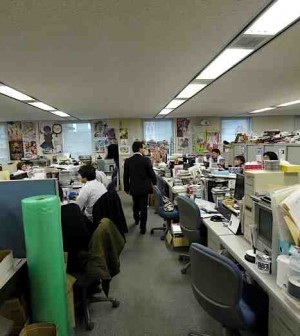- Belgium comes to Yamashita Park
- Residential Villa in Phuket Entices Remote Workers With Long-Stay Rates
- Rare pieces of French glass art at the Mirai Museum of Art
- Feast on fresh fish and seafood at the 2024 ‘Sakana’ Festival
- Would you like to ride in a Louis Vuitton gondola lift?
- Naked Snow Aquarium
- Festive lights at Yomiuriland will get you feeling the holiday vibes
Why Japan scores poorly in employee engagement

October is Healthy Workplace Month in Canada, so last month I was immersed in a sea of research, articles and best practices for creating healthy, thriving workplaces. When this annual promotion of healthy workplaces started thirteen years ago, the focus was on increasing the physical health and fitness of a company’s workforce in order to decrease the costs associated with illness, absenteeism and poor performance.
Over the last decade, however, the growing body of research on the importance of employee engagement for long term growth and profitability of an organization has shifted the focus from the physical factors of workplace health to the mental and emotional ones. Employee engagement is the measure of how emotional commitment and employee has to their job and their organization and the extent to which they are willing to exert extra effort, beyond what is required, on behalf of the organizations goals. It is, in essence, a measure of the health of a workplace’s culture.
Most large organizations in North America now closely measure and attempt to impact employee engagement. Why? Huge worldwide research initiatives such as the Towers Watson Global Workforce Study demonstrated that companies with high sustainable engagement scores had and average operating margin close to three times higher than those companies with low traditional engagement scores. A study by the Gallup Organization, another leader in global research on employee engagement, demonstrated that companies in the top decile of engagement exceeded their competition by 72% in earnings per share.
The bad news? Japan consistently scores at the bottom of the pile in worldwide surveys of employee engagement.
During a recent visit from some good friends– both tenured university professors who have been living in Japan for more than twenty years – I was reminded of the following frustrations in their workplace which make it easy to see why Japan might score so poorly in employee engagement:
Mandatory 8 hour marathon meetings (instead of written memos) so that meeting organizers can ensure everyone has received the required information. (The meetings fail in this regard since a large number of people are there in body but not in mind and openly sleep, read or otherwise tune out.)
The difficulty of speaking up and challenging the status quo even when things are obviously not working due to the need to save face, respect corporate and cultural hierarchies, and otherwise be perceived as a team player.
The acceptance of “we’ve always done it this way” or “it’s the Japanese way” as a valid and logical end to questioning a policy or procedure that is ineffective or inefficient.
The expectation of working long hours and being willing to always put your work and the company before the rest of your life (or at least to make it appear this way).
There are many great things about Japanese workplace culture – lifetime employment, teamwork, long range planning, and the dedication to kaizen – but the expectation to fit in, save face, and give your soul to the company comes at a price. Employees simply cannot achieve or sustain peak performance if it comes at the cost of subverting their own needs and opinions. For companies this translates directly into lost creativity, commitment, quality and ultimately, profits.
What can Japanese leaders do to create healthier workplace cultures and foster more engaged employees?
Enable
Make sure employees are clear on the organization’s goals and their role in achieving these goals and provide them with the tools, resources and support they need to do great work.
Remove obstacles and inefficiencies. Look at all of the ways that things have traditionally been done and ask if that is really the most productive way to go about it. Identify the most blatant inefficiencies by asking some of your newer employees to point out the organizational practices that don’t make sense to them. (Then listen and make changes instead of making excuses why it has to be that way.)
Energize
Communicate your company’s purpose, vision and passions on a regular basis in ways that inspire employees to connect with what is personally meaningful for them in their work.
Coach your staff to understand and align with their strengths in order to improve their energy, performance, creativity and results.
Empower
Provide employees with the opportunity to balance their work and personal lives with flexible work arrangements, access to fitness facilities, and the ability to adapt their work to suit their personal style.
Ensure leaders display honesty, integrity, and alignment with the organizations core values and empower employees to use their best judgement to do the same.
Choose to discuss rather than to discipline if the choices employees make are misguided at times, but risk the urge to revert to an old “command and control” style of leadership.
Not only is employee engagement critical for enhancing innovation, performance and profitability in the short term, as Japan’s population ages, it will become essential to attract international talent to Japanese companies. In short, healthy workplace cultures and employee engagement may not be the Japanese way now – but it better get put on the agenda soon or the Japan’s economy will pay the price.











